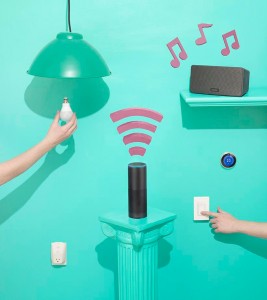It sounds like the sort of trivial debate you might have with a friend over drinks at a pub, but here’s an actual back and forth I had with my phone the other day while driving.
copyright by www.canadianbusiness.com
Me: “Who invented pizza?”
Phone: “Legend has it that [Raffaele] Esposito was called upon to make a pizza for Italian King Umberto I and Queen Margherita when they visited Naples in 1889.”
Me: “Okay, well, who invented Hawaiian pizza?”
Phone: “It appears that Hawaiian pizza is not from Hawaii, but from Chatham, Ont., where retired pizza cook Sam Panopoulos says he invented the dish at Satellite Restaurant in 1962.”
Me: “Why do people hate it?”
Phone: “Pizza is an Italian thing. Pineapple is a Hawaiian thing. Some people feel the two shouldn’t be combined and many don’t feel the sweet pineapple belongs or goes along with the flavours that a pizza should convey.”
My curiosity for pizza’s origins had been spurred innocuously enough. I’d just driven by an Italian restaurant and got to wondering about the food’s history. Hawaiian pizza and some people’s distaste for it had also been in the news recently.
Thank you for reading this post, don't forget to subscribe to our AI NAVIGATOR!
“Okay Google”
Rather than pull over and do an Internet search, I looked at my phone sitting in its mount and activated Google Assistant by uttering the magic phrase, “Okay Google…”In response, a friendly female voice quickly and accurately answered my queries, drawing from Wonderopolis, the National Post and Quora, respectively. The conversation made me hungry, so I asked where I could get the best pizza—non-Hawaiian, of course. My voice assistant suggested a few of the best-reviewed places nearby, based on my location. I gulped down lunch a few minutes later, feeling as though both my hunger and my thirst for useless knowledge had been satiated.
Voice Assistants on the rise
Pizza minutiae aside, Google Assistant and its kin are quickly becoming the next big thing in technology—and for good reason. Not only can these artificially intelligent voice assistants—including Amazon’s Alexa, Microsoft’s Cortana and Apple’s Siri among others—provide us with trivia, they can also perform many actually useful tasks. Voice assistants are increasingly able to manage our calendars, send messages and book tables at restaurants. They can learn our habits and anticipate what we might want: suggesting when we should leave for work for instance, or automatically playing our favourite songs on the nearest speaker. They’re also moving beyond smartphones. Soon, they’ll be found in everything from toasters to coffee makers, clothing and cars.
read more – copyright by www.canadianbusiness.com


It sounds like the sort of trivial debate you might have with a friend over drinks at a pub, but here’s an actual back and forth I had with my phone the other day while driving.
copyright by www.canadianbusiness.com
Me: “Who invented pizza?”
Phone: “Legend has it that [Raffaele] Esposito was called upon to make a pizza for Italian King Umberto I and Queen Margherita when they visited Naples in 1889.”
Me: “Okay, well, who invented Hawaiian pizza?”
Phone: “It appears that Hawaiian pizza is not from Hawaii, but from Chatham, Ont., where retired pizza cook Sam Panopoulos says he invented the dish at Satellite Restaurant in 1962.”
Me: “Why do people hate it?”
Phone: “Pizza is an Italian thing. Pineapple is a Hawaiian thing. Some people feel the two shouldn’t be combined and many don’t feel the sweet pineapple belongs or goes along with the flavours that a pizza should convey.”
My curiosity for pizza’s origins had been spurred innocuously enough. I’d just driven by an Italian restaurant and got to wondering about the food’s history. Hawaiian pizza and some people’s distaste for it had also been in the news recently.
Thank you for reading this post, don't forget to subscribe to our AI NAVIGATOR!
“Okay Google”
Rather than pull over and do an Internet search, I looked at my phone sitting in its mount and activated Google Assistant by uttering the magic phrase, “Okay Google…”In response, a friendly female voice quickly and accurately answered my queries, drawing from Wonderopolis, the National Post and Quora, respectively. The conversation made me hungry, so I asked where I could get the best pizza—non-Hawaiian, of course. My voice assistant suggested a few of the best-reviewed places nearby, based on my location. I gulped down lunch a few minutes later, feeling as though both my hunger and my thirst for useless knowledge had been satiated.
Voice Assistants on the rise
Pizza minutiae aside, Google Assistant and its kin are quickly becoming the next big thing in technology—and for good reason. Not only can these artificially intelligent voice assistants—including Amazon’s Alexa, Microsoft’s Cortana and Apple’s Siri among others—provide us with trivia, they can also perform many actually useful tasks. Voice assistants are increasingly able to manage our calendars, send messages and book tables at restaurants. They can learn our habits and anticipate what we might want: suggesting when we should leave for work for instance, or automatically playing our favourite songs on the nearest speaker. They’re also moving beyond smartphones. Soon, they’ll be found in everything from toasters to coffee makers, clothing and cars.
read more – copyright by www.canadianbusiness.com
Share this: